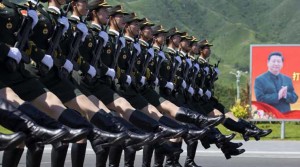N EW DELHI: US Defense Secretary Ashton Carter and his Indian counterpart agreed on Tuesday to strengthen their cooperation on maritime security, as concerns grow in Washington over Beijing’s growing military ambitions.
EW DELHI: US Defense Secretary Ashton Carter and his Indian counterpart agreed on Tuesday to strengthen their cooperation on maritime security, as concerns grow in Washington over Beijing’s growing military ambitions.
Carter is in New Delhi to bolster a strategic relationship Washington considers crucial in the face of what it sees as China’s rising assertiveness, particularly in the South China Sea.
“Both sides agreed to strengthen cooperation in the area of maritime security,” said a joint statement issued after Carter held talks with Indian Defense Minister Manohar Parrikar.
The two sides “reaffirmed the importance of safeguarding maritime security and ensuring freedom of navigation and over flight throughout the region, including in the South China Sea,” said the statement.
Carter is seeking to bolster a strategic relationship Washington sees as crucial in the face of China’s growing military ambitions.
His meetings with his Indian counterpart Parrikar and Prime Minister Narendra Modi is aimed at shoring up security and defense ties with the regional power.
Washington has increasingly turned its focus to Asia as it tries to counter China’s growing assertiveness in the South China Sea, and is eager for India to play a greater role in its network of regional defense alliances.
India, the world’s biggest arms importer, wants access to US technology so it can develop sophisticated weapons at home, a key part of Modi’s “Make in India” campaign to boost domestic manufacturing.
“Both our values and our interests overlap in so many important ways, and that happens with few countries around the globe,” Carter told reporters late Monday in India.
A senior US defense official, speaking on condition of anonymity, said China was “operating more frequently both throughout Southeast Asia and in the Indian Ocean,” something both Washington and New Delhi were “watching closely.”
Modi, who enjoys close ties with US President Barack Obama, has criticized what he called China’s “expansionist mindset.”
Regional superpower China is expanding its deep-water naval presence and staking a claim to disputed areas of the South China Sea and the East China Sea.
Beijing claims almost all of the contested South China Sea, which is important for international shipping, and has in recent months built massive structures including radar systems and an airstrip over reefs and outcrops.
It has also courted countries in the Indian Ocean, pouring money into the Maldives and Sri Lanka, where it funded the construction of a deep-sea port.
India, which has historically relied heavily on Russia for arms imports, is seeking US help to develop its own new-generation aircraft carriers.
New Delhi wants American know-how on building more sophisticated launch technology that would allow it to deploy heavier aircraft on the vessels than existing carriers allow.
Washington has increasingly turned its focus to Asia as it tries to counter China’s growing assertiveness in the South China Sea, and is eager for India to play a greater role in its network of regional defense alliances.
Regional superpower China is expanding its deep-water naval presence and staking a claim to disputed areas of the South China Sea and the East China Sea.
Beijing claims almost all of the contested South China Sea, which is important for international shipping, and has in recent months built massive structures including radar systems and an airstrip over reefs and outcrops.
It has also courted countries in the Indian Ocean, pouring money into the Maldives and Sri Lanka to the annoyance of New Delhi, which regards those countries as part of its sphere of influence.


Comments are closed.